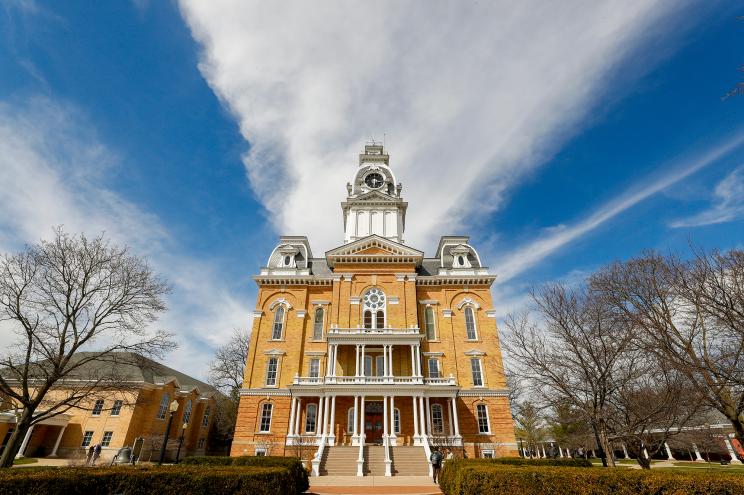“But you’re Jewish!”
Other than “Why?” this is the most common reaction when I share that I attended a Christian college.
Actually, I attended two.
Recent events on college campuses have invited me to reflect on my own college experience — and what it could have been had I attended another school.
At Columbia, I would have fled campus to celebrate Passover safely, rather than hosting a seder of my own and inviting professors, as I did at Hillsdale College.
At Yale, my eyes might have been stabbed by a protester rather than opened as they were at Pepperdine University, where I attended graduate school.
Hillsdale and Pepperdine regularly invited Jewish guest speakers, for whom students filled lecture halls and commencement spaces to the brim.
But this month, students at Duke walked out of their own graduation, unwilling to hear Jerry Seinfeld’s speech.
Jewish students are not safe on many college campuses.
At my Christian colleges, I not only survived, I thrived.
I was 33% of the Christian Hillsdale College’s Jewish population at one point, but nonetheless I found kehila kedosha, holy community, in its dining hall and dorms.
I studied Hebrew there.
I baked challah weekly, and in breaking bread with my Christian friends and classmates, I found spiritual kinship and rich conversations about faith that reminded me of Hebrew school.
Professors habitually encouraged me to share my perspective, inviting me to enrich class without tokenizing my experience or relying on my frankly limited expertise on Judaism.
On day one of her Western Rhetorical Tradition class, my thesis advisor and treasured mentor Dr. Kiledal discussed Jewish speech laws: We must use our words carefully because, when we speak, we engage in acts of creation — with our words, we can create hope or hate, kindness or cruelty.
Dr. Kiledal taught me how to use my words to create goodness.
Students at fallen institutions have not learned this lesson.
Dr. Fincher, a Jewish professor of classics, arrived on campus in my junior year.
On holidays, we would collaborate.
Dr. Fincher would lead service, and I would prepare a meal.
Each holiday, we outgrew our space as more friends came to learn from Dr. Fincher’s genius and try my bubbe’s chicken soup recipe.
When someone found swastika graffiti in an old dorm bathroom stall, the dean immediately took the ruined stall door off its hinges and assured me and the other Jewish students that evil is not welcome on campus.
My Christian friends joined me for Shabbat regularly, even when Shabbat dinner was challah and ramen noodles, and we had to light candles outside because fire hazards had no place in a dorm. We sang hinei matov, a song celebrating how good and sweet it is to gather as friends.
To sit with friends, to learn, to eat, to pray in many languages, to eat some more — what a perfect thing to do with the freedom that Hillsdale so ardently defends.
In many American universities, students abuse that freedom.
They block Jewish students from leaving libraries and entering class.
Agitators invade and lay claim to public spaces, and in soil meant for learning and community, they grow hatred and violence.
They scream antisemitic atrocities and physically attack Jews.
They do not embrace community and curiosity like my Hillsdale colleagues did, but rather they intimidate, pass judgment, harass, and lie.
In the name of freedom, they abuse it; on order to liberate the oppressed, they oppress the liberated.
I came home to Southern California for graduate school at Pepperdine University, another Christian college.
Here too, professors encouraged me, classmates supported me, and campus administration stood steadfast against antisemitism.
President Jim Gash has repeatedly called on other college presidents to confront the evil infesting their campuses and endangering their students.
In class, Dr. McAllister taught me that it matters more whose you are than who you are.
Relationships with Christian colleagues taught me empathy, patience, and grace in discussing opposing perspectives, and they made me a better person.
In Dr. Kaufman’s Dispute Resolution class, I studied the intractable conflicts plaguing Israel for millennia. He taught me that it’s impossible to negotiate with people who want to kill you.
I cannot negotiate with protestors who advocate Israel’s annihilation.
I cannot come to a consensus with those who want me quiet — or compliant — or dead.
On other college campuses, where a non-Palestinian can wear a keffiyeh but I must hide my magen david necklace to walk safely between classes, I could not foster peace even though I want to.
I can, however, express my utmost gratitude to those who have blessed and kept me.
As other colleges’ alumni tore down pictures of hostages, spreading hate disguised as justice, Hillsdale and Pepperdine alumni texted, called and sent letters with one message: We love you.
College friends who had not heard from me in months offered to shelter my family if we faced local evil.
To my Christian college classmates: Thank you, and I love you too.
Like Hillsdale taught me, I am going to pursue the good.
And as Pepperdine taught me, I am going to lead by example.
I thank you both.
And I thank all those colleges that have cultivated communities wherein thinking is free, liberty is treasured, and Jewish students are safe.
Sara Garfinkle is a high school English teacher and a graduate of both Hillsdale College and Pepperdine University.
